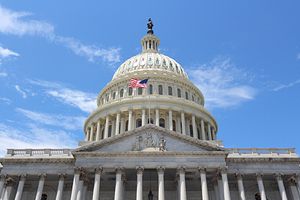The Rebalance authors Mercy Kuo and Angie Tang regularly engage subject-matter experts, policy practitioners and strategic thinkers across the globe for their diverse insights into the U.S. rebalance to Asia. This conversation with James C. Ho – Partner in the Dallas office of Gibson, Dunn & Crutcher, where he leads the firm’s Appellate and Constitutional Law Practice Group in Texas, has over a decade of government experience, most recently as Solicitor General of Texas and as Chief Counsel to U.S. Senator John Cornyn, and named by The National Law Journal among the “upper echelons of Supreme Court practice” and one of the top minority lawyers in the U.S. – is the 36th in “The Rebalance Insight Series.”
Birthright citizenship is a political and constitutional issue in the 2016 U.S. presidential race. Please encapsulate its legal concept and the seminal case United States vs. Wong Kim Ark, a Chinese-American cook.
The 14th Amendment provides that “all persons born or naturalized in the United States, and subject to the jurisdiction thereof, are citizens of the United States.” In other words, if you are (1) born in the United States, and (2) “subject to the jurisdiction” of the United States, you are guaranteed birthright citizenship. The debate over birthright citizenship essentially turns on the meaning of the phrase “subject to the jurisdiction.” But the point is simple: It just means that you have to be subject to the laws of the United States. That covers most – but not all – people within the U.S. If you come to the U.S. as a foreign diplomat, then you and your family enjoy diplomatic immunity and are not “subject” to U.S. law. But if you are not immune from U.S. law, then you are “subject” to U.S. law. In Wong Kim Ark, the U.S. Supreme Court invoked this principle and held that a U.S.-born child of Chinese nationals was entitled to birthright citizenship under the Fourteenth Amendment.
What were the legal ramifications of the Wong Kim Ark case in terms of judiciary powers vis-à-vis the executive and legislative branches?
Wong Kim Ark is consistent with a long line of cases in which the U.S. Supreme Court has construed the Constitution to place certain limits on the political branches.
What was the crux of the historical debate between proponents and dissenters in the 39th Congress over the Citizenship Clause and concept of jus soli (citizenship by place of birth)?
Senator Jacob Howard of Michigan introduced the language that became the Citizenship Clause of the Fourteenth Amendment. He explained that his proposed language would simply codify in the U.S. Constitution an established principle already in existence under the common law, namely the concept of jus soli. As he explained, his language “will not, of course, include persons born in the United States who are foreigners, aliens, who belong to the families of ambassadors or foreign ministers accredited to the Government of the United States, but will include every other class of persons.” Notably, no senator disagreed with his understanding of the law. Senators only debated whether it should be the law. In particular, Senator Edgar Cowan of Pennsylvania opposed the Howard amendment on the ground that he opposed guaranteeing birthright citizenship to the U.S.-born children of Chinese nationals. Senator John Conness of California made clear that Senator Cowan was right about the meaning of the Howard language – and said that (unlike Senator Cowan) he supported the Howard language for precisely that reason.
Explain the legal distinction between “jurisdiction” and “allegiance” in relation to the Equal Protection Clause.
“Jurisdiction” simply means power. If you are subject to the jurisdiction of the United States, you are subject to the power of the United States. You are legally obliged to follow the laws of the United States. And if you do not follow the laws of the United States, you may be subject to penalties under the laws of the United States. So if you come to the United States as a foreign diplomat, you and your family enjoys diplomatic immunity and you are not subject to the “jurisdiction” or power of the United States and are not obliged to follow U.S. law. But if you come to the United States as a foreign national, with no legal immunities against the force and effect of U.S. law, then you are required to obey U.S. law and are thus considered “subject to the jurisdiction” of U.S. law. In other words, jurisdiction means obedience, not allegiance.
Based on your analysis, what legal criteria are essential in defining “American”?
Congress has enacted a variety of statutes that extend U.S. citizenship in various situations. But as a matter of constitutional law, you are guaranteed U.S. citizenship if you are born or naturalized in the United States and subject to the jurisdiction of the United States.
































